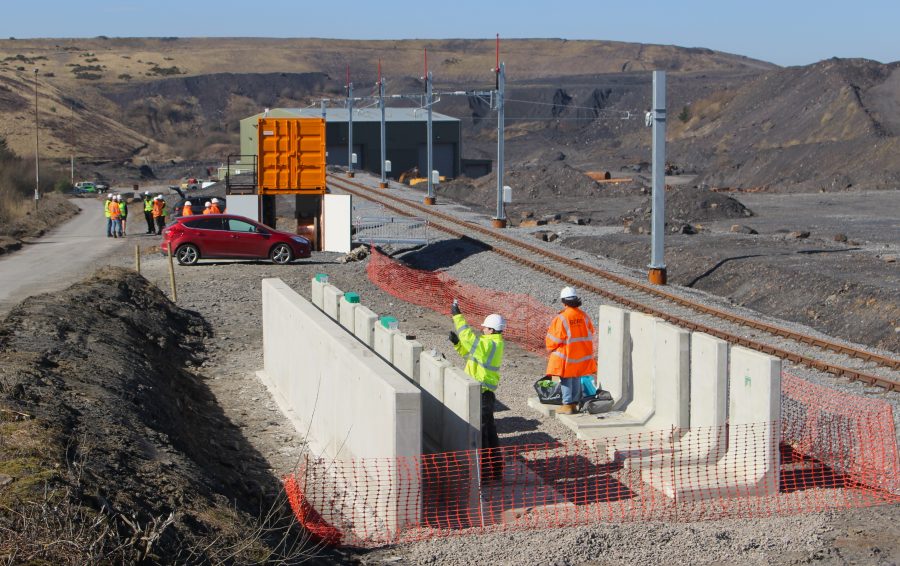‘The future belongs to those who prepare for it today.’
By Rob Forde, Director of Strategy and Skills, GCRE Ltd
I joined the Global Centre of Rail Excellence to make a difference. In particular, to ensure that the facility we are developing aids not only the rail industry, but has a sustainable and long-term impact on the people, economy and coalfield communities around our site.
That’s the reason why I’m so excited about the latest training initiative we’ve launched at GCRE – the ‘Access to Rail Engineering Programme’. The scheme has been designed to assist individuals who have lost their jobs as a result of the closure of the blast furnace at the nearby Tata Steelworks.
The programme is a small one to start – offering 72 people from Tata or the supply chain the opportunity to get qualified to work in rail and find new employment in the industry, but it has the potential to be expanded if we can prove the programme has a positive affect.

The impact of what is happening at Tata is hugely significant for the region’s economy. Almost 3000 jobs are being lost, with many more impacted across the supply chain. When something like this happens it can be devastating not only for the communities involved, but the entire region. Particularly because challenges of deprivation and de-industrialisation were already significant ones even before the Tata job losses were announced.
The Access to Rail Engineering programme we have developed, with our partner Train’d Up, is funded by the UK government and provides a 3-week course in rail skills that matches them with industry employers and paid employment. Training will be delivered on the GCRE site utilising the facilities we have here, including our NSAR-approved training area.
Through the programme we are helping deal with two big issues. Firstly, we are helping broker new employment for those affected by the Tata closure and secondly, we’re increasing the skilled workforce in rail. The rail industry has for 200 years been an anchor of the UK economy, currently employing over 100,000 people. However, it faces significant structural challenges, particularly regarding skills shortages. The last National Skills Academy for Rail (NSAR) Annual Workforce Survey provided stark evidence of that issue. It showed that we have an ageing workforce, with over 28% of the rail industry is now aged over 50.
The report highlighted that the rail workforce decreased by 9.4% in 2024, underscoring the urgency of recruiting and retaining younger talent. It also reinforced the need for further and faster moves toward greater diversity and inclusion in the industry as only 17.4% of the workforce are female and 14.4% come from an ethnic minority background. Quite simply, we need to widen the pool of talent in rail.

This is a critical risk for the sector as experienced workers near retirement with knowledge transfer and succession planning becoming increasingly important. Major projects such as HS2 face acute shortages of civil engineers, project managers and track workers and this challenge will only grow as they mature and the wider pipeline of investment the UK Government has recently committed to translates into new projects. Leveraging the power of rail to retrain and employ some of the experienced and skilled workers from Tata and its supply chain is right not only from a social justice perspective, it can also help fill urgent gaps in the rail industry.
An economic study undertaken for GCRE last year has shown that our project can create more 1,100 jobs and contribute more than £300m of GVA to the economy in its first decade alone. These jobs are desperately needed to support the region and rebuild prosperity in the coalfield communities around our site. The jobs GCRE and its partners will create will be high quality and offer individuals meaningful opportunities for progression – part of a wider, strategic response to the economic challenges South West Wales faces.
There aren’t many industries that still offer individuals a quality ‘ladder’ through their career, with opportunities for upskilling and professional development for a diverse range of backgrounds, but rail is one. I didn’t come from a privileged background when I started my rail career but I’ve progressed with the support of many along the way and had the opportunity to work internationally several times. I’m not sure the same opportunities would have been afforded me in other industries.
For me, this programme is about reinforcing rail’s critical role in our community and in our economy. Employers are getting a great deal with access to hard-working, skilled individuals who are used to working in industrial conditions. The candidates have great skillsets and experiences that, after the initial training, can be put to immediate use by the rail industry. Already we can see the enthusiasm and the thirst the first cohort have to put their skills to use in rail.

What has particularly impressed me is the passion of the Neath Port Talbot Tata Employability Team. At GCRE we’re working closely with them to create opportunities for as many of the affected workforce and the supply chain as possible. They have access to a huge pool of talent in the area and are doing all they can to create opportunities for them.
We’re still looking for more employers to get involved so please reach out if you are interested. Skills development is at the heart of what we are doing at GCRE not just for our own benefit but for that of the whole industry – and at the heart of that is a strong relationship with rail employers.
In 2025, GCRE moves into the next phase of its development, with more demonstrations and more quality training taking place on site. Through that work we’re starting to see the tangible impact GCRE can have – and that’s hugely exciting.